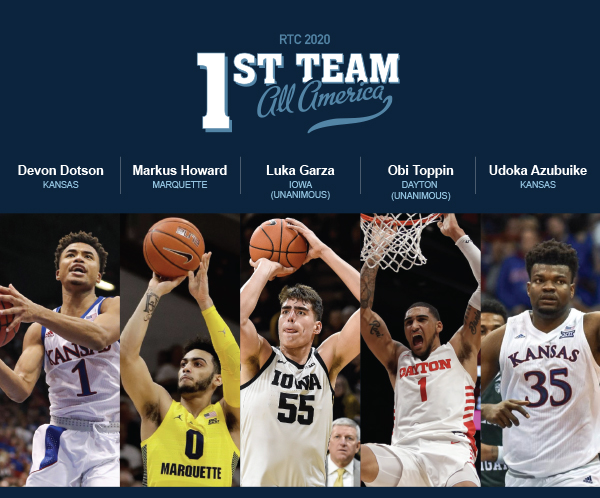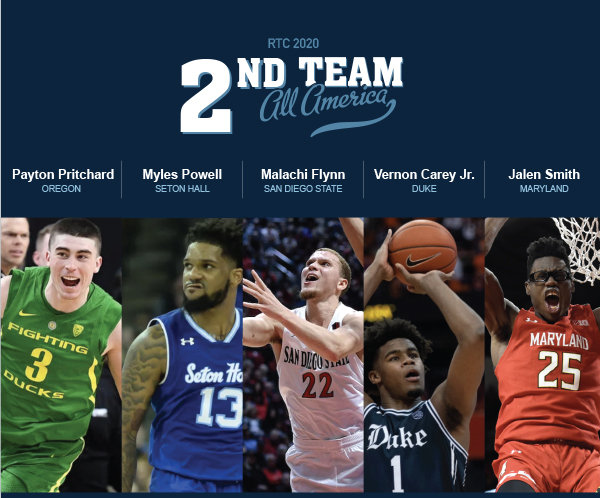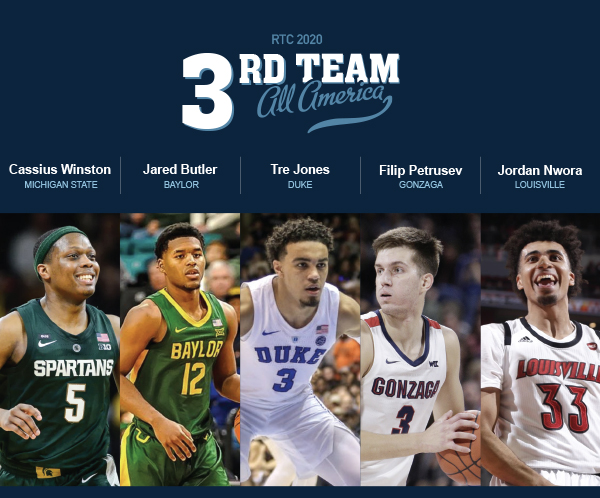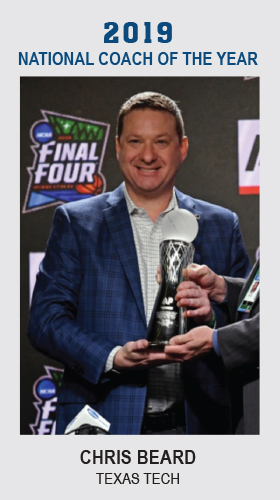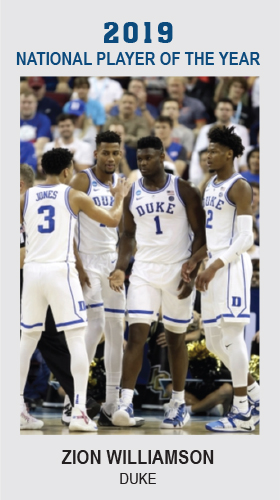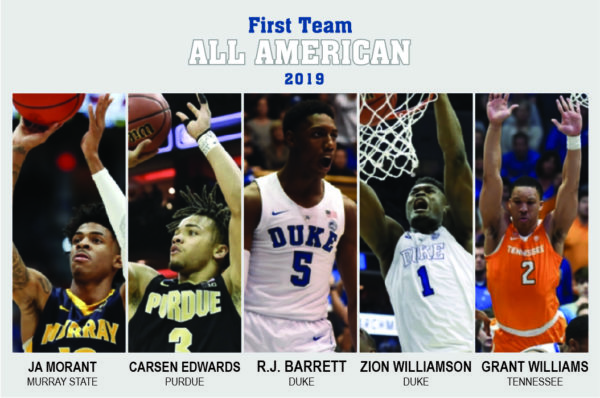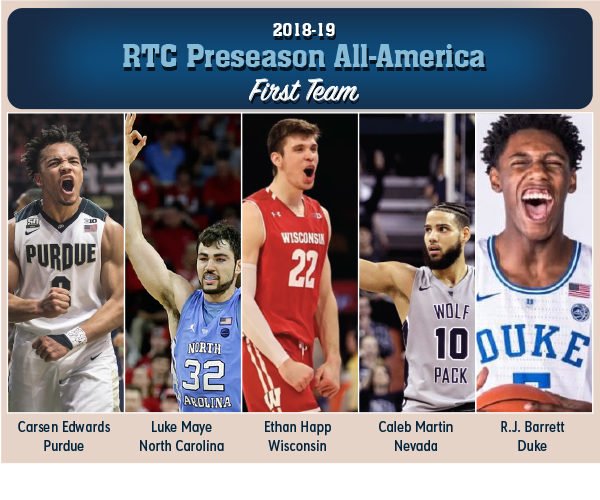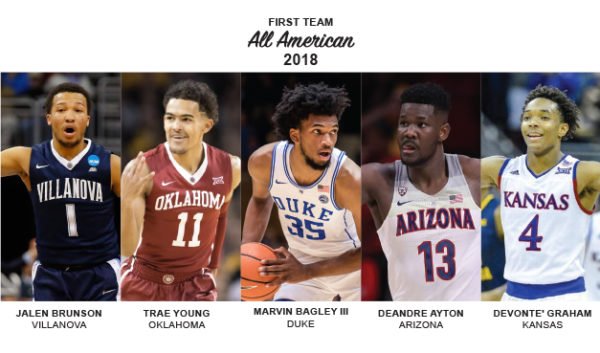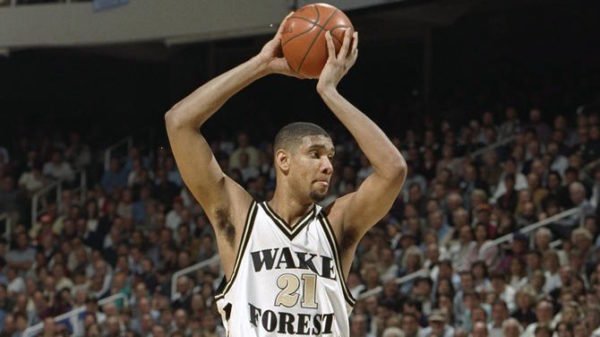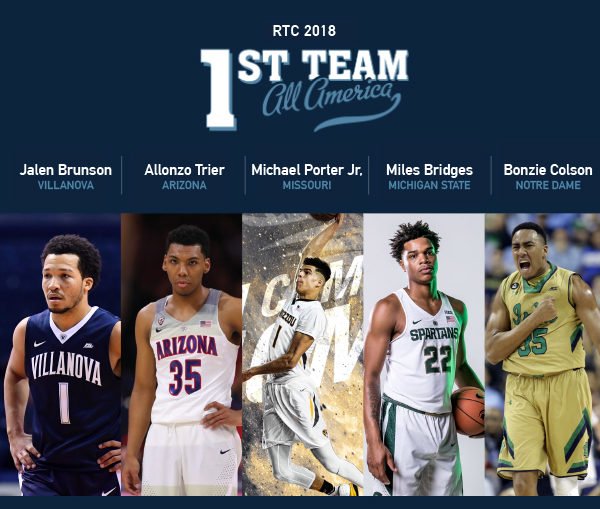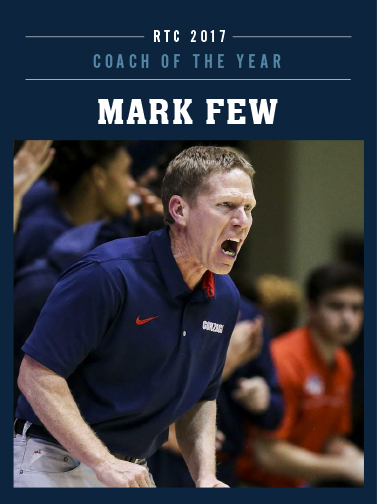2020-21 Rush the Court All-America Teams and Yearly Awards
Posted by Matthew Eisenberg on April 4th, 2021The 2020-21 Rush the Court awards and All-American selections are here. While five freshman have been selected to the All-American teams, they do not come from the usual suspects of Duke or Kentucky. In fact, the blueblood quartet of Duke, Kansas, Kentucky and North Carolina are without a single player being represented on any of this year’s three All-America teams. While there might be some surprises, the RTC Player of the Year is anything but, with two-time unanimous RTC First Team All-American Luka Garza winning the award. Gonzaga’s undefeated run to the Final Four lands two on the First Team and gives Mark Few the top spot in the coaching ranks.
Player of the Year: Luka Garza, Iowa
Coach of the Year: Mark Few, Gonzaga
First Team All-America
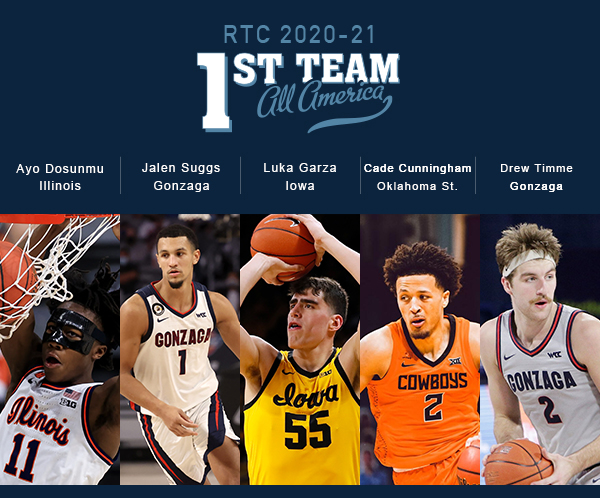
- Ayo Dosunmu, Junior, Illinois (Unanimous 1st-Team) – (20.1 PPG, 6.3 RPG, 5.3 APG, 38.6% 3PT) Ayo Dosunmu was the only player nationally to average at least 20/5/5 on the season and he did so while leading the Illini to the Big Ten Tournament championship. Dosunmu overcame a late-season injury to his face, but donned a mask and kept on producing. With the junior at the helm of the Illini attack, Illinois grabbed hold of a #1 seed for the first time since the 2004-05 season.
- Jalen Suggs, Freshman, Gonzaga – (14.0 PPG, 5.5 RPG, 4.5 APG, 50.2 FG%) Jalen Suggs thrust on the scene right from the start, beginning his college career with 24 points and eight assists in the season opener against Kansas. Several weeks later, Suggs poured in a season-high 27 points against Iowa. A threat on offense with the ball in his hand and a threat on defense at nearly all times with his excellent anticipation and quick hands, as exhibited in last night’s incredible late-game sequences in the Final Four.
- Cade Cunningham, Freshman, Oklahoma State (Unanimous 1st-Team) – (20.1 PPG, 6.2 RPG, 3.5 APG, 40% 3PT) The top ranked recruit in the country helped guide an Oklahoma State team that was unranked to begin the year into the Big 12 Championship Game and a spot ranked among the top 15 teams entering the NCAA Tournament. In a situation clouded with the unknown of an NCAA investigation, Cunningham stuck with his commitment to Oklahoma State and was able to get the Cowboys into the postseason. Cunningham was the definition of a “prime-time performer” as seen in his 40-point game on the road in Norman in a come from behind win over rival Oklahoma.
- Drew Timme, Sophomore, Gonzaga (19 PPG, 7.2 RPG, 65% FG) Timme finished his 2019-20 season by scoring 17 points off of the bench in Gonzaga’s WCC Championship Game win against Saint Mary’s. The terrific end to last season carried over into this season. Timme more than doubled his scoring output, while finishing with the second-best field-goal percentage among the 173 players who attempted 300 or more shots. The mustached magician took center stage in the Elite Eight with a dazzling and dominating performance against the defense of USC and Evan Mobley, scoring 23 points, grabbing five rebounds and dishing out four assists.
- Luka Garza, Senior, Iowa (Unanimous 1st-Team) (24.1 PPG, 8.7 RPG, 1.7 APG, 55.7% FG) A unanimous RTC 1st-Team All-American last season, Luka Garza again finds himself as a unanimous 1st-Team All-American. Garza began the year scoring 102 points in his first three games and finished the year averaging 23.3 over his final 10 games, including 36 on 14-of-20 shooting in the Hawkeyes NCAA Tournament loss.
Second Team All-America
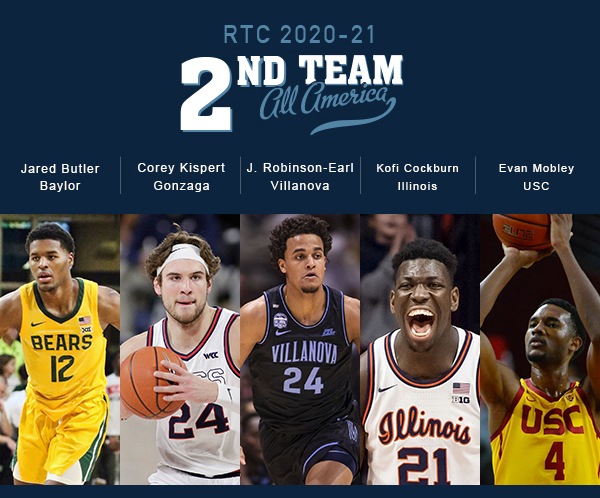
- Jared Butler, Junior, Baylor (16.5 PPG, 4.8 APG, 40.4% 3PT, 2 STL/G) While COVID ended a tremendous Baylor season last year, Jared Butler returned and helped guide the Bears right back to their spot near the top of the rankings. The junior guard set career-best marks across the board. Butler was the only player in the Big 12 to average 15 points, 5 assists and 3 rebounds per conference game since the 2017-18 season.
- Corey Kispert, Senior, Gonzaga (18.9 PPG, 5 RPG, 45.3% 3PT) After averaging just 6.7 points per game as a freshman and 13.9 PPG as a junior, Kispert raised that to 18.9 per night in his senior year. Kispert’s shooting splits had 50/45/90 being discussed late into the season, a player who made three or more three-pointers in 17 games on the season. Kispert will leave Gonzaga having made the third-most three-pointers of any Bulldog since the start of the 2000-01 season.
- Jeremiah Robinson-Earl, Sophomore, Villanova (15.7 PPG, 8.5 RPG, 2.2 APG) After finishing fifth on the team in scoring as a freshman, Robinson-Earl led the Wildcats this season. After the season-ending injury to teammate Collin Gillespie near the end of the season, Robinson-Earl responded by taking on an even bigger role in the Villanova offense. While Villanova was a popular team to pick against heading into the NCAA Tournament, Robinson-Earl averaged 20 points, 8.5 rebounds and six assists per game in Villanova’s first two tournament games.
- Kofi Cockburn, Sophomore, Illinois (17.7 PPG, 9.5 RPG, 65.4% FG) Kofi Cockburn was the only player in the nation to average north of 15 points and 7.5 rebounds per game while shooting at least 60 percent from the field. Cockburn’s size and strength led to 15 games with at least four offensive rebounds, which ranked fourth in the nation.
- Evan Mobley, Freshman, USC (16.4 PPG, 8.7 RPG, 2.9 BLK/G) Evan Mobley finished the season taking home the Pac-12 Player of the Year, Freshman of the Year and Defensive Player of the Year awards. Mobley finished with multiple blocked shots in 27 games, the highest total in the nation. Mobley was the only player in the country to average 15 points, eight rebounds, and two blocks per game. He was the anchor to the USC defense which according to KenPom finished an adjusted defensive efficiency of 88.1, well below the team’s average of 99.5 in Andy Enfield’s first seven years with the Trojans.
Third Team All-America
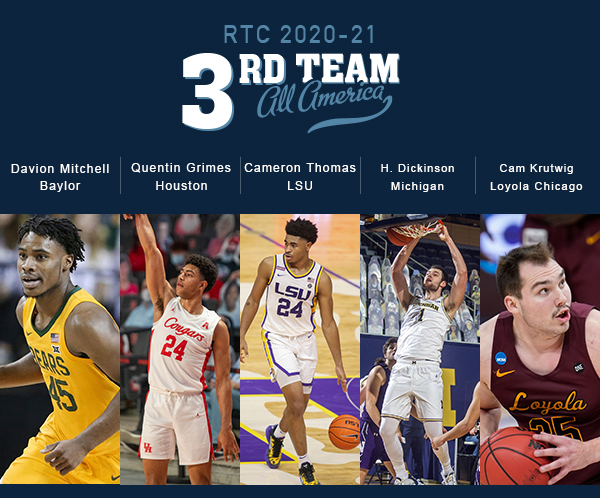
- Davion Mitchell, Junior, Baylor (14 PPG, 5.3 APG, 2 STL/G, 45% 3PT) After shooting just 31% from beyond the arc during his first two years in college, Davion Mitchell knocked down 45% of his 131 attempts this season. In addition to being a terrific shooter, Mitchell took home Big 12 Defensive Player of the Year honors. Entering the Final Four, Mitchell has 18 games with at least two steals. In the team’s first 14 games of the season, Mitchell was averaging 11.5 points per game, whereas over the next 14 games, Mitchell was scoring 16.6 points per game.
- Quentin Grimes, Junior, Houston (18 PPG, 5.8 RPG, 41.2% 3PT, 99 3PM) Since returning to action in early February after missing a game against Our Lady of the Lake, Houston’s Quentin Grimes has averaged 20.2 points and 4.5 three-pointers per game. When Houston lost AAC Preseason Player of the Year Caleb Mills to the transfer portal, the Cougars turned even more to Grimes. After making 94 three-pointers in his first two collegiate seasons, Grimes is sitting at 99 heading into the Final Four. With one more make, he will become just the ninth Houston Cougar to eclipse 100 makes from deep since the 1992-93 season.
- Cameron Thomas, Freshman, LSU (23 PPG, 3.4 RPG, 88% FT) LSU’s Cameron Thomas finished the season leading the nation in freshman scoring and finishing fourth overall. In the NCAA Tournament, the he powered through top 20 defenses to score 57 points in two games. No one in the country had more 25 point outings than Thomas did with 16 instances.
- Hunter Dickinson, Freshman, Michigan (14.1 PPG, 7.4 RPG, 59.8% FG) The Big Ten Freshman Year of the Year burst onto the scene quickly averaging 18 points per game and 8.1 rebounds per game in his first 10 collegiate games. He quickly replaced the production left behind from Jon Teske and formed a dynamic front-court partnership with Franz Wagner.
- Cameron Krutwig, Senior, Loyola (Chicago) (15 PPG, 7 RPG, 3 APG, 57.4% FG) A four-year starter at Loyola (Chicago), Krutwig earned Missouri Valley Conference Player of the Year award this season. A versatile player who scored in double-figures in all but three games, had 26 games with two or more assists, and 12 games with at least eight rebounds. In the Ramblers upset Second Round win over Illinois, Krutwig gave the Illini defense problems for 40 minutes, finishing the game with 19 points, 12 rebounds, and five asissts.
Honorable Mentions: Max Abmas (Oral Roberts), Charles Bassey (Western Kentucky, James Bouknight (Connecticut), Trayce Jackson Davis (Indiana), Herbert Jones (Alabama), Neemias Queta (Utah State), McKinley Wright (Colorado), Moses Wright (Georgia Tech)





























